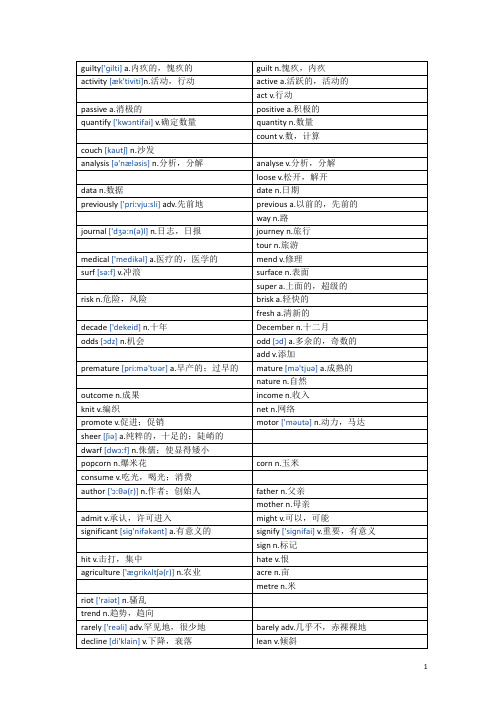大学英语四级词汇讲解:表示目的.doc
四级词汇精讲1

buoy
PART 01 n. 浮标;航标
eg:The ship kept the buoy on her off side. 这条船在浮标的左边。
PART 02
vi. 1.使维持较高水平;使行情看涨;提振;使上涨 2.鼓励;鼓舞 3.使浮起【海】
eg.consult
a dictionary 查阅词典 a teacher 请教老师
consult with a friend 和朋友商议
1. 攀登;登高;爬
eg:Then we ascend steeply through forests of rhododendron. 然后我们在杜鹃花丛中沿着陡坡向上攀爬.
are continually interruping me with
silly questions?
A interrupt
指中途打断,如:interrupt the conversation
B bother
指扰乱某人,使其不能专心, 常用句式:bother sb. with sth
C disturb D interfere
PART 01
n. ①(C)(某物的)一部分
②(C)(食物的)一份 ③(责任、过失、职责等的)一份
portion
PART 02 vt. 分配,把…分给
eg: A large portion of the unemployed become school drifters.
大量没有就业的毕业生成了“校漂族”。
PART 02 vi. 尽力,努力
PART 03
n. ①(C,U)极度紧张,过劳 ② (U)张力 ③ (C,U)拉紧,绷紧 ④ (C,U)扭伤,拉伤
4级词汇重点解释

看系列:see behold watch look regard view glance gape peep peer 这些词在四级考试中都有“看、注视”的意思:see 看,看见。
最通用的一个次。
可以指不经意的看到;如:As he stood there, he saw tow men enter the bar. 他站在那里时,看到两个人进入了酒吧。
也可以指有意图的看没事物;如:Let’s see your ticket please! 请让我们看看你的票。
behold 看着,瞧着。
指盯着看,常强调被看之物给人以强烈冲击或印象。
如:We beheld the ship sinking. 我们看着那艘船沉下去。
watch 看着,注视。
强调注视,指注意力集中与受到吸引,全神贯注,常用于祈使句中。
如:He breathlessly watched the spider attempt to spin its web for the third time. 他凝神屏息地观看那蜘蛛试图第三次结网。
look 看,打量,注视。
用途广泛的一个词。
可以指有意识地把目光转向某事物关看;如:The passers-by looked into the window curiously. 路人好奇地往窗子里面看。
也可以指偶尔不经意地把眼光转向某事物;如:He looked absent-mindedly here and there only to see nothing. 他心不在焉地东瞧西看,什么也没看见。
regard 看着,打量着,审视着。
指从一定距离上观看,或怀着某种特定的情绪态度打量。
如:The policeman regarded the movements of the man across the street with suspicion. 那警察怀疑地打量着街对面那个男人的举动。
view 审视,察看。
英语四级考试一词多义

英语四级考试一词多义第一篇:英语四级考试一词多义above / beyond: 介词,后面接抽象而不是具体名词时表示“无法做到”,例如:“ above comprehension ”的意思是“无法理解”。
in the absence of something: “缺少,没有”,用于替代“ in short of ”或者“ be lacking in ”。
be absorbed in something: “专心从事”。
abuse: 用在物品词后面表示“过量使用”,用在有生命的事物后面则表示“虐待”。
have access to something: 这个短语的意思要看后面接的单词是什么,比如“ have access to town ”表示“有道路通往市区”,“ have access to the teacher ”则是“有条件向老师请教”,总之,翻译的时候要灵活处理。
accessible / available: 形容词,中文的含义同上。
by accident: 介词词组,属于副词用法”,修饰动作,意思是“偶然”。
account: 名词,“解释,解说,叙述”。
account for: 本身是“解释说明”的含义,但在使用的时候可以翻译成“是… 的原因”。
acknowledge: “向某个人表示感谢”。
acquire: 这个词的中文也非常灵活,通常由后面跟随的名词决定,如“ acquire bad habits ”就是“养成坏习惯”的含义。
在商业用语中,该词则表示“吞并”。
in action: “起作用”。
adapt: 动词,在科技用语中表示“(将某个领域的研究成果)应用于(另一领域)”。
address somebody: “对某人说话,发言”。
afford: 用法非常灵活,总的来讲表示“承担不起”,后面可以接表示金钱,时间或者情感的词汇。
cannot afford toagent: 目前的含义主要指“行政职能机构”,比如美国的很多国家机构都叫 agency,另外在生物化学领域,这个词翻译成“介质,载体”,而在计算机英语中则是“服务器”的意思。
英语四级考试常考词汇及例句解析

英语四级考试常考词汇及例句解析英语四级考试常考词汇及例句解析(1)1.alter v. 改变,改动,变更例句:There is something wrong with my layout, I have to alter it.单词辨析:alter、change、shift、convert的区别alter常用来表示轻微的、细节的改变,是自身细节上或外表的变化,而没有变成(change into)另一事物。
change这个词比较通用,可以指任何变化,也用于彻底改变,与原来完全不同。
它还可以作名词表示变化,以及零花钱。
shift表示变动的时候,多指位置、方向以及方式的改变。
它作名词时还可表示轮班、计谋、手段、变化等。
convert指进行全部或局部改变以适应新的功能或用途。
指信仰或态度时,强调较激烈、大的改变。
它作名词时就表示皈依者,或者改变信仰的人。
2.burst vi. n. 突然发生,爆裂burst作动词时不及物,所以接宾语时后面要加介词。
主要有两种形式:burst into+n. / burst out+doing例句:Because of the sad news, she burst into tears. /she burst out crying. 因为这个令人难过的消息,她大哭起来。
3.dispose vi. 除掉;处置;解决;处理(of)dispose作为不及物动词,其后接宾语时要加介词of。
例句:Mum ordered me to dispose of these unfashionable clothes.老妈命令我把这些过时的衣服处理掉。
4.blast n. 爆炸;气流 vi. 炸,炸掉blast作动词表示爆炸同explode,也可表示严厉批评(criticize),名词形式跟动词一致,相对应的近义词是explosion,criticism。
例句:Fortunately, no people injured in the blast.幸运的是,爆炸没有造成人员伤亡。
四级高频词汇解析必备单词一览

四级高频词汇解析必备单词一览词汇是语言运用的基础,尤其对于英语学习者来说,积累并准确理解高频词汇是提升语言运用能力的关键。
本文将为大家呈现四级高频词汇的一览表,并进行相关解析,旨在帮助读者更好地掌握这些必备单词。
1. abandon词性:动词解析:表示放弃、遗弃或抛弃某人或某事物。
在四级考试中,一般用于描述某人放弃决定、放弃计划、放弃信念等。
例如,"He had to abandon his dream of becoming a musician due to financial difficulties."2. accurate词性:形容词解析:表示准确无误、精确的。
在考试中常用于描述某事物、某数据或某人的行为准确度高。
例如,"The weather forecast turned out to be accurate."3. acknowledge词性:动词解析:表示承认、确认、鸣谢等。
在考试中常用于表达对某个事实、观点或某人的贡献表示认可或感谢。
例如,"We must acknowledge the importance of education in shaping a better future."词性:动词解析:表示获取、获得某物、某技能或某品质等。
在考试中常用于描述某人通过学习、工作等方式获得新的知识或技能。
例如,"She acquired fluency in Spanish after studying abroad for a year."5. adapt词性:动词解析:表示适应、调整某人或某事物以适应新环境、新要求等。
在考试中常用于描述个人或事物对新的变化做出调整。
例如,"We need to adapt our teaching methods to the needs of the students."6. adequate词性:形容词解析:表示足够的、充足的。
不同“目的”用法也不同

英语专四常见词辨析:不同“目的”用法也不同aim, goal, purpose, end, target, object这些名词均有“目标、目的”之意。
1.aim :从本义“靶子”引申而来,侧重比较具体而明确的目标,但常指短期目标。
例如:You aim too low. (你志向太低。
)2.goal :指经过考虑和选择,需经坚持不懈的努力奋斗才能达到的最终目标。
例如:When he at last arrived in Rome he felt he had reached his goal.(当他终于抵达罗马时, 他感到自己已达到了目的。
)3.purpose :普通用词,既指以坚决、审慎的行动去达到的目的,又指心中渴望要实际的目标。
例如:He returned to his homeland with the purpose of serving his own people.(他返回祖国, 意在为祖国人民服务。
)4.end :指心目中怀着的某种目的,强调结果而非过程。
较正式用词。
例如:Do the ends justify the means?(只要目的正当就可以不择手段吗?)5.target :指射击的靶,军事攻击目标。
引申指被攻击、批评或潮笑的目标。
例如:What's the target readership of this paper? (这份报纸以哪些人为读者对象?)6.object :强调个人或需求而决定的目标、目的。
例如:Our object is to get at the truth. (我们的目的是弄清事实真相。
)。
四级词汇讲义(带注释)

yield v.产出;屈服 major ['meidʒә] a.主要的,多数的 occur [ә'kә:(r)] v.发生 vast [vɑ:st; væst] a.广阔的 harvest ['hɑ:vist] v.收割,收获 improvement [im'pru:vmәnt] n.改善,提升 feature ['fi:tʃә] n.面部特征,特征 particularly adv.特别,尤其 sharp [ʃɑ:p] a.锋利的 relative ['relәtiv] n.亲属关系 a.相对的 stability [stә'biliti] n.稳定性 sufficiency [sә'fiʃәnsi] n.充足 reverse [ri'vә:s] a.相反的 v.倒退 problematic [prɔblә'mætik] a.造成问题的 account for 解释 calorie ['kælәri] n.卡路里 grain [ɡrein] n.作物 note [nәut] v.注释,使知道 effort ['efәt] n.努力 security [si'kjʋәriti] n.安全性,安全 qualify ['kwɔlifai] v.使有资质;限定 optimistic [ɔpti'mistik] a.乐观的 argue ['ɑ:ɡju:] v.争论;主张 current ['kʌrәnt] a.流通的,当前的 wilderness ['wildәnis] n.荒野 actual ['æktjuәl] a.实际的 factual a.真实的 debate [di'beit] n.辩论 footnote ['fʋtnәʋt] n.注脚 basis ['beisis] n.基orce n.劳动力,全体员工 flat [flæt] a.扁平的 through v.穿过 produce v.制造 adjust v.调整 just a.正好的 organize v.组织 cost [kɔst] v.花费 absent a.缺席的 present a.出席的,现在的 v.赠送,呈现 n.礼物 rise v.升起 parent n.父母 eyebrow n.眉毛 brow n.眉毛 brush v.刷子 learn v.收获,获知,学习 professor n.教授 before prep.在前 divide v.划分 wheel n.轮 car n.车 part n.部分 sure a.确定的 exit n.出口 knows v.知道 lance n.长矛 v.用长矛刺戳 initiate v.入门,开始;首创 exit v.离开 n.出口 title n.名称,头衔 face n.脸 zone improvement plan 地区提升计划 crisis ['kraisis] n.危机,危急时刻
英语中表示目的的几种常用方法(一)

英语中表示目的的几种常用方法(一)一、用to do sth表目的用不定式表目的是最简单也是最常用的方法,它既可以用于句末,也可用于句首,但比较而言,用于句首时,其强调意味较浓。
如:After missing a term through illness he had to work hard to catch up with the others. 他因病一学期未上课,得努力赶上其他同学。
To avoid any delay please phone your order direct. 为免延误,请直接打电话预订。
To keep themselves awake they sat on the floor and told each other stories. 为了不至于睡着,他们坐在地板上轮流着讲故事。
To avoid back problems, always bend your knees when you lift heavy objects. 为了不使背部受伤,你在扛重东西时,一定要将膝盖弯曲着。
不定式的否定式为not to do sth,而不是to not do sth。
如:She had to struggle not to give in to a desire to laugh. 她极力控制自己不要笑出来。
Then there was the mad rush not to be late for school. 然后就是匆忙往学校赶,以免迟到。
I went to France not to study French, but to study architecture. 我去法国不是为了学法语,而是为了学建筑。
He claimed he had bought the cigarettes for home consumption, not to sell them. 他声称他买烟是为了自家享用,不是为了出售。
- 1、下载文档前请自行甄别文档内容的完整性,平台不提供额外的编辑、内容补充、找答案等附加服务。
- 2、"仅部分预览"的文档,不可在线预览部分如存在完整性等问题,可反馈申请退款(可完整预览的文档不适用该条件!)。
- 3、如文档侵犯您的权益,请联系客服反馈,我们会尽快为您处理(人工客服工作时间:9:00-18:30)。
2018年6月大学英语四级词汇讲解:表示目的
To make maters worse for the government, it soon emerged that the Princess’strip had been approved by the Foreign Office, and that she was in fact very well-informed about both the situation in Angola and the British gov ernment’s policyregarding landmines.
英语四级译文:
随后证明,公主的旅行得到了外交部的批准,而且她确实熟悉安哥拉的情,也了解英国当局对于地雷的政策,这使政府的处境更加艰难。
四级词汇讲解:
本句的主干是it emerged that...and that…其中,两个that引导的从句都是形式主语it所代替的真正主语。
the situation in Angola and the British govemment’s policy reg arding landmines为be well-informed about的宾语。
emerge在本句中意为”(事实)显现出来”。
如:
It has emerged that he is the one who stole the money.现在终于发现,是他偷了那笔钱。
the Foreign Office在本句中指”英国的外交部”。
Angola指”安哥拉”,是一个位于非洲西南部的国家。
landmine意为”地雷”。
英语四级考点归纳:
动词不定式作状语时,一般表示目的。
如:
He went to Paris to learn French.他去巴黎学法语。
而本句中的to make matters worse for the government则表示结果。
由于动词的现在分词形式常被用来表示结果,因此,本句可以变为:
It soon emerged that the Princess’s trip had been approved by the Foreign Office,and that shewas in fact very well-informed about both the situation in Angola and the British government’spolicy regarding landmines, making matters worse for the government.。
